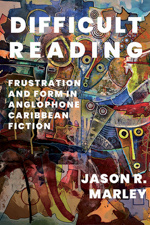Today, we are happy to bring you our conversation with Jason R. Marley, author of Difficult Reading: Frustration and Form in Anglophone Caribbean Fiction.
What inspired you to write this book?
There are so many brilliant Caribbean works that often don’t get the attention they deserve because of their perceived difficulty. I wanted to open up a broader space to talk about them.
But, really, the idea for the book began when I was first introduced to the work of Denis Williams. I had heard about Williams’s 1968 novel The Third Temptation long before I read it: that it wasn’t considered a true Caribbean novel, that it was unreadable, and that it side-stepped issues of race and colonialism. But when I finally read the book, I was struck by both the degree of colonial trauma and suppressed Caribbean identity lurking below its surface. It seemed to me what was compelling about the novel was its struggle to render visible what could not easily be said or expressed—and that this emphasis on inscrutability and impasse was far from entirely unique in mid-twentieth century Caribbean writing. Reading Williams made me want to further examine that idea that the receptive implications of Caribbean writing deemed difficult could in fact reveal new insights into Caribbean experience.
What did you learn and what are you hoping readers will learn from your book?
It’s my hope that the book will encourage readers to reflect on experiences of frustration in fiction in more immediate and productive ways. Difficulty in fiction is, for the most part, still perceived pejoratively. But this isn’t the case for other mediums. Video games, for example, are often praised because of their difficulty. A few semester’s ago, when I was teaching Roger Mais’s Brother Man, a student remarked that they found Mais’s novel “too difficult”; but that same student, the next class, was excitedly speaking openly about being stuck on a boss in FromSoftware’s extremely popular—but notoriously difficult—game Elden Ring. Their frustration and the impasse made the game more engrossing. This led to a productive conversation about how emotive responses and frustration can be a point of access and a path to understanding.
It seemed to me so many of the Caribbean novels I was teaching that semester were also trying to generate emotive responses, not to motivate the player, of course, but to engender a more nuanced understanding of the experiences of colonial trauma. Building off that idea, the book shows how reflecting on the experiences of frustration and confusion can provide new insights into Caribbean struggle. Ultimately, I want to foster a deeper understanding of the receptive potential of difficulty—and, in so doing, we can ultimately better appreciate the radical innovation of Caribbean artistry.
What surprised you the most in the process of writing your book?
That it is not always easy to view difficulty and frustration as a productive force. In the midst of writing the book, I lost a dear friend, a parent, and a beloved pet. Writing and thinking about how to negotiate immense frustration, difficulty, and an inability to put into words trauma and loss in many ways made me more attuned to the importance and ingenuity of what the texts I focus on in the book hope to achieve.
What’s your favorite anecdote from your book?
My favorite anecdotes in the book are when moments of confidence and self-assuredness collapse into confusion or frustration. The book opens with an anecdote about the Beacon magazine’s infamous short story contest, whereupon the editors chastise their readers to essentially “do better” and write stories that capture Caribbean experience. But they are unable to really identify what those fictions should look like, and the result is increasing frustration and exasperation with their readers. On the face of it, such anecdotes seem like examples of comic failures—but in actuality they provide a snapshot of how struggles or articulation and frustration were integral to negotiating the nuances of Caribbean experience. This same struggle of articulation emerges in the novels I examine in the book.
What’s next?
I’m working on a new project that explores masculine fragility and self-deception in the work of Lindsay Barrett, Roy Heath, and Garth St. Omer, among others.





